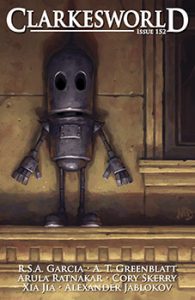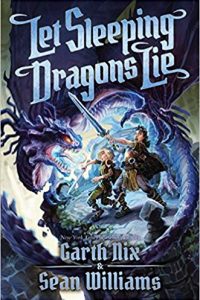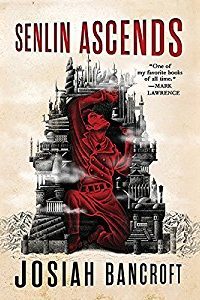Karen Burnham Reviews Short Fiction: Clarkesworld, Lightspeed, and BCS
 Clarkesworld 5/19
Clarkesworld 5/19
Lightspeed 6/19
Beneath Ceaseless Skies #277, #278
May’s Clarkesworld is a treasure trove, with five original stories that bring us both the rich and the bizarre, sometimes all at once. It starts with “Tick-Tock” by Xia Jia (translated by Emily Jin), a tale of a dreamer and those who construct his dreams, (which can be made to order). There’s a very effective repetitive leit motif that follows us as we move from character to character, tying everything together on a truly surreal level. “Empress in Glass” by Cory Skerry imagines a woman engaged in a very public campaign of personal body modification that could be viewed anywhere on a spectrum from transcendent to grotesque, and we get flashbacks to her childhood that shed some light on her rather twisted motivations. It’s an amazing SFnal conceit, although I wish the story offered more resolution than it does.
In contrast, a story that comes to a satisfyingly concrete ending is one of my favorites of the issue, “Insaan Hain, Farishte Nahin” by Arula Ratnakar. One scientist has engineered a way of growing a duplicate consciousness that can then be uploaded and sent into space. We get the experience of an uploaded brain when it wakes up in space and of the scientist on the day of the upload and launch: things go dramatically and spectacularly wrong as the scientist’s wife goes into labor at the same time that a terrorist opposed to the project makes an assassination/sabotage attempt on both the scientist and the mission. There are so many great touches to this story, from the Bollywood elements, the scientist’s very bright son, and her relationship with her wife, to how the space-based version reacts to her circumstances and takes control of her fate. If the Internet Science Fiction Database is to be believed, this might be Ratnakar’s first genre appearance; if so, I cannot wait to see more from this author.
My other favorite comes from another relative newcomer, R.S.A. Garcia. “The Sun from Both Sides” starts out as a simple story of a couple living outside a village, deeply in love. It reads almost like a fantasy fable at the beginning, so we get a heck of a case of whiplash when the husband is taken by slavers and the wife activates her long-dormant battle machinery to go into orbit to rescue him. That story comes to a satisfying conclusion, which makes the remainder even more unexpected, as a visitor appears demanding that the husband return to a world he’d long abandoned, one with a hierarchy based on chess conventions and using an alien forest as a kind of quantum super-computer. In this last phase the husband drives the action as he reluctantly reinserts himself in the machinations of his homeworld. This is one of those stories that keeps evolving hypnotically before your eyes as you read it.
The science fiction side of Lightspeed for June starts with a future similar in some outlines to Ratnakar’s: in “Between the Dark and the Dark” by Deji Bryce Olukotun, environmental degradation has forced Earth to send out a wide variety of generation starships, hoping some will succeed in seeding life on another world. Each is as closely monitored as possible, given the delays, by Stewards remaining in the Solar System, who are given the power of life and death over the crews. When images from one ship seem to indicate that it is descending into cannibalism, its Steward pushes to send an immediate termination command. Another Steward, who already had to terminate her crew, sets out to see if there is something more going on than the still images suggest. Interlaced with this plot, we get scenes from a coming-of-age sort of ritual onboard the possibly doomed ship, showing the much more complex reality than either Steward could imagine. I loved both the detective plot in the Solar System and the odd evolution of both tech and ritual on the starship; they combine together to create a rich portrait of this future.
The other science fiction story couldn’t be a more different response to our Anthropocene future. Instead of broadening horizons, “The Harvest of a Half-Known Life” by G.V. Anderson imagines humanity continuing in subsistence circumstances, respectfully harvesting every useful material from the corpses of the dead and demanding by custom that they leave their hard-won knowledge behind in books for the use of the community. The protagonist is the daughter of a deaf woman, who is haunted by the last sign she saw from her mother, telling her to follow the ghosts that she’d always been warned against. She chooses to stay out in the ruins instead of settling in a village with her betrothed (no matter how nice he is). She has to navigate social pressures, along with a mystery left behind by her mother’s oldest friend out in the ruins which eventually leads her to a rewarding discovery. No matter how hard, life finds a way, which is perhaps the most optimistic message we can take away from our current age.
Beneath Ceaseless Skies #277 pairs two stories about quests for bones. In “The Bone Flute Quartet” by K.J. Kobza, a young girl dreams of her heroine, the witch Myrra Ferrinn. Her mother wants her to take up an honest trade, but her Ommama hands her a quest regarding Ferrinn’s artefacts. Bretchen proves herself more than up to the task in this particular coming-of-age tale, although sometimes meeting your hero isn’t quite what you hoped. Navid in “The Thirty-Eight-Hundred Bone Coat” by R.K. Duncan is a young man staying closer to home. His family business is making magical artefacts, and they accept an outrageously expensive commission from a particularly rich and paranoid man. While his sister works on procuring the cloth and thread, his mother on weaving, and his father on the magic, Navid has to dive to get all the bones needed for the coat. He also has to turn to some rather creative methods to get what he needs out of the river. Duncan ratchets up the tension nicely as the deadline for delivery approaches.
Issue #278 turns its gaze towards war. In Kate Osborne‘s “The Two-Bullet War“, Mila is the Queen’s “Gun,” as the Queen lies dying of cancer. The Queen’s twin sons are so intent on their dispute that they hardly notice when Mila announces the Queen’s passing. A succession crisis immediately ensues, and of course ensnares both Mila and her forbidden lover. They have definite opinions on which prince should prevail, and the question is how to ensure the right outcome while preserving anything of their lives in a world that decides such things through dueling by proxy. Then in “Abacus of Ether” by Stephen Case, Grey is a magical insurance adjuster, selling policies to soldiers going out to fight the King’s unending war. She can adjust their premiums based on their regiment, position, armaments, amulets – and based on a “tasting” done by her magical colleague Magdelena, one which can divine their future in broad strokes. Eventually Grey and Magdelena find themselves drawn into a scheme to try to trick the King out of his course of very poor tactical decisions, and get a chance to confront him directly with the cost of what he’s wrought on his kingdom. I appreciated the translation of our insurance concepts into the fantasy world.
Recommended Stories
“The Sun from Both Sides”, R.S.A. Garcia (Clarkesworld 5/19)
“Between the Dark and the Dark”, Deji Bryce Olukotun (Lightspeed 6/19)
“Insaan Hain, Farishte Nahin”, Arula Ratnakar (Clarkesworld 5/19)
Karen Burnham is an electromagnetics engineer by way of vocation, and a book reviewer/critic by way of avocation. She has worked on NASA projects including the Dream Chaser spacecraft and currently works in the automotive industry in Michigan. She has reviewed for venues such as Locus Magazine, NYRSF, Strange Horizons, SFSignal.com, and Cascadia Subduction Zone. She has produced podcasts for Locusmag.com and SFSignal.com, especially SF Crossing the Gulf with Karen Lord. Her book on Greg Egan came out from University of Illinois Press in 2014, and she has twice been nominated in the Best Non Fiction category of the British SF Awards.
This review and more like it in the July 2019 issue of Locus.
 While you are here, please take a moment to support Locus with a one-time or recurring donation. We rely on reader donations to keep the magazine and site going, and would like to keep the site paywall free, but WE NEED YOUR FINANCIAL SUPPORT to continue quality coverage of the science fiction and fantasy field.
While you are here, please take a moment to support Locus with a one-time or recurring donation. We rely on reader donations to keep the magazine and site going, and would like to keep the site paywall free, but WE NEED YOUR FINANCIAL SUPPORT to continue quality coverage of the science fiction and fantasy field.





